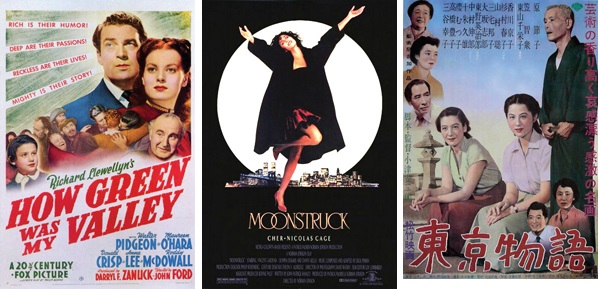Three stories, rich in plot and character, all wrapped up around the theme of Generations.
How Green Was My Valley
A Welsh mining town in the Victorian era is brought to shimmering life in this 1941 adaptation of Richard Llewellyn’s best-selling book. The father, Gwilym Morgan (Donald Crisp), is a proud miner, set in his ways, who must deal with the changing ideas of his grown children. His youngest son Huw, still a boy (precocious Roddy McDowall), narrates the film from an adult perspective, lending the story the burnished quality of memory: “There is no fence or hedge around time that has gone.” Director John Ford won an Oscar for his lyrical treatment of the material, which is rooted in the marvelously detailed small-town set, built not in Wales (the coming of war scrubbed plans to shoot on location) but on a hillside in Santa Monica! You’d never guess the California location, as the evocation of a specific way of life — and the inexorable sense that the way of life is changing — is superb. Adding more melancholy is the star-crossed attraction between the local reverend (Walter Pidgeon) and Morgan’s daughter (Maureen O’Hara). “How Green Was My Valley” won the Oscar for Best Picture over “Citizen Kane,” a fact that has caused some retrospective commenters to suggest a great Oscar outrage. Those who love this movie may respectfully disagree.
Moonstruck
It must be the full moon: what else could explain the suddenly pixilated life of Loretta Castorini (Cher), who agrees to marry respectable Johnny Cammerari (Danny Aiello) only to be immediately swept off her feet by Johnny’s tortured, wolflike, one-handed brother Ronny (Nicolas Cage)? And then Loretta learns that her father (Vincent Gardenia) has been having an affair, which leads his wife (peerless Olympia Dukakis) to begin a string of one-liners that never seems to end, even when she’s not on screen. (This movie is endlessly quotable. Ronny: “I love you.” Loretta: “Snap out of it!”) Cher and Dukakis took home 1987 Oscars for their performances, and John Patrick Shanley won for his screenplay — the hilarity of which never eclipses the warm and wise sense that all of these crazy people are trying, in their own ways, to flounder toward some kind of human negotiation with each other, flaws and all. “Moonstruck” conjures up a lot of laughs, but what remains in its wake is an unmistakable glow.
Tokyo Story
An elderly couple travel to the big city to visit their children and grandchildren, and some time later the voyage is reversed. For the great Japanese filmmaker Yasujiro Ozu, this is enough structure to create one of the cinema’s finest emotional journeys, a movie in which some of life’s most grown-up lessons arrive not with devastating thunderclaps but with the delicacy of falling cherry blossoms. Death is a significant occurrence, but so is a young woman’s premature realization that “Life is disappointing, isn’t it?” Many of Ozu’s films deal with generational issues — how to adapt to the modern ways of young people, how to respect the traditions of elders — but this 1953 masterpiece might be the pinnacle of his career.



